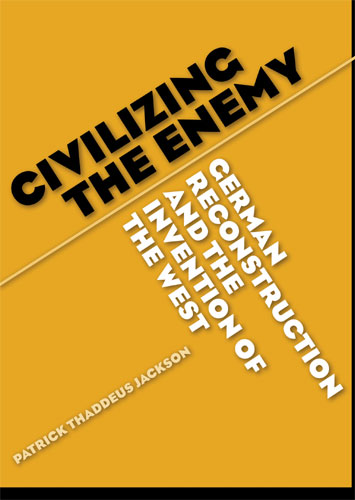Since the late 19th century and
especially after WW2, the rhetorical commonplace ‘the
West’/’Western Civilization’ has
been used by politicians to publicly justify policies, commitments and to
reframe issues domestically and internationally, particularly in the debates
around German reconstruction (how it was constructed as an equal ally after
being presented as the uncivilized enemy) , the European Recovery Program and
NATO. In the last few decades, especially in the Cold War rhetoric ,the term
has had a solid place in everyday usage and came to be taken as ‘given’ as we
see in the quote below.
 ‘’The existence and rhetorical
currency of a notion like ‘Western
Civilization’ is far from obvious,
considering that the twinned principles of sovereignty and anarchy continue to
structure world politics to a significant degree. Despite globalization,
sovereign states, acknowledging no higher authority than themselves, continue
to claim a monopoly on the legitimate use of force and to reserve to themselves
the right to make final decisions about the distribution of resources and the
overall shape of global authority. The supposed existence of a community like
Western Civilization flies in the face of this traditional notion, and also
contradicts the neoliberal assertion that the globalized world is now a world
of firms and consumers.’’ (from
the Preface)
‘’The existence and rhetorical
currency of a notion like ‘Western
Civilization’ is far from obvious,
considering that the twinned principles of sovereignty and anarchy continue to
structure world politics to a significant degree. Despite globalization,
sovereign states, acknowledging no higher authority than themselves, continue
to claim a monopoly on the legitimate use of force and to reserve to themselves
the right to make final decisions about the distribution of resources and the
overall shape of global authority. The supposed existence of a community like
Western Civilization flies in the face of this traditional notion, and also
contradicts the neoliberal assertion that the globalized world is now a world
of firms and consumers.’’ (from
the Preface)
‘’Central to my account is the
rhetorical commonplace of ‘Western
Civilization’, the notion that the United
States, Canada and Western Europe participate in a common cultural community
with millenia-old roots in classical Greece.’’ (from
the Preface)
"Western civilization is not given but politically
made. In this theoretically sophisticated and politically nuanced book Patrick
Jackson argues that Germany's reintegration into a Western community of nations
was greatly facilitated by civilizational discourse. It established a
compelling political logic that guided the victorious Allies in their
occupation policy. This book is very topical as it engages critically very
different, and less successful, contemporary theoretical constructions and
political deployments of civilizational discourse."
—Peter J. Katzenstein, Cornell
University
In ‘Civilizing
the Enemy ; German Reconstruction and the Invention of the West’, Patrick Thaddeus Jackson traces the
history of the Western Civilization rhetoric by looking first at how ‘civilization’ was only used in the singular before 19th
century (and its relation to the Western Christian view of history) and came to
be used in the plural with the help of German conservative intellectuals
towards the end of the 19th century. Then he goes on to examine the
atmosphere of the political debates in Germany during WWI, the unexpected
success of Oswald Spengler’s ‘The Decline of the West’ , the ‘Western
Civilization/Contemporary Civilization’ course
that came to be taught first in Columbia University which enabled the passage
of the notion of the ‘West’ to pass to the American political
elite.
Throughout the book he uses a
methodology of which he gives a detailed account in the first part of the book.
The methodology (influenced largely by Weber’s work)
takes root from the assumption that one cannot possibly know what public
figures/politicians sincerely think/believe but can only study the public
statements made and the rhetorical commonplaces used by them to justify policy
proposals or political commitments. Rhetorical commonplaces in turn cannot
possibly be deployed if they do not correspond to certain images/vague concepts
in the imagination of the audience.
By examining the debates among
American and German policymakers during and after WWII with regards to US’ role postwar world order and the
German reconstruction, Jackson asks vital questions and encourage us to
question what we came to take as granted over the years. It claims that the
notion of Western Civilization is a recent development and the rhetoric was
used to justify the rehabilitation and the remilitarization of West Germany
after WWII. After all, when looking in retrospect some events may look
inevitable and obvious if the alternatives are not examined closely and the
roles of public legitimation, rhetoric and framing/reframing the issue at stake
with respect to policy decisions are often overlooked and understated.
‘’ In this respect, Jackson's
book is also a direct--and perhaps the most important--rejoinder to
Huntington's immensely influential The Clash of Civilizations and the Remaking
of World Order. Jackson not only proves that "The West" is an invented,
and imagined, community, but offers an alternative understanding of what
civilizations are and how we should think of them. In other words, unlike many
of Huntington's other social-constructionist critics, Jackson thinks we should
take civilizational politics seriously.’’ – Daniel Nexon
Mehmet Göksu
Kayaalp